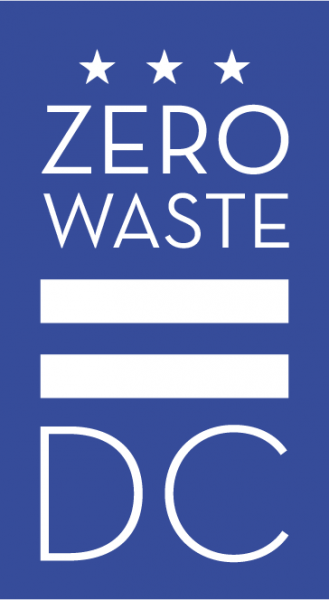WASTE DIVERSION REGULATIONS
(NEW!) CLEAN Collections Amendment Act of 2024
On March 21, 2025, D.C. Law 25-297, Containing Litter and Ensuring Adequate Neighborhood (CLEAN) Collections Act, went into effect. The CLEAN Collection Act amends the Sustainable Solid Waste Management Amendment Act of 2014 and the following requirements apply to multi-family properties:
- Provide adequate capacity for the disposal of solid waste (equivalent to at least 32 gallons of solid waste container space per residential unit per week),
- Provide equal volume for source-separated trash and recyclable materials, such that residents are able to dispose of as much recyclable material as they are trash,
- Provide dumpsters, rather than 32-gallon or 64-gallon waste containers, where feasible, and where dumpsters are infeasible, provide waste containers that shall be secured in such a manner so as to protect against theft of the container when not set out for collection.
- Enter into contracts with collectors of solid waste to receive services not less than twice per week at each property (excluding weeks where a District holiday or hazardous weather conditions prevent multiple collections)
Questions? Contact a Recycling Outreach Specialist for help interpretting how the CLEAN Collections Act affects commercial properties by emailing us at [email protected].
Zero Waste Omnibus Amendment Act of 2020
To amend the Sustainable Solid Waste Management Amendment Act of 2014. Of note, this Act requires the submission of a Souce Separation Plan for multi-family dwellings with 80 or more units, commercial buildings with 10 or more units, and businesses or nonprofit organizations with 101 or more employees.
Sustainable Solid Waste Management Amendment Act of 2014
This law established requirements for the management of solid waste and the separation, collection, and disposal of solid waste by both the District of Columbia government and the private waste collectors that operate in the District. The law requires the District to develop a plan to achieve 80% diversion from landfills and waste-to-energy and to annually report on progress towards this goal. The Office of Waste Diversion and the Interagency Waste Reduction Working Group were created to implement specific requirements of the law and guide the District towards its zero waste goals.
Sustainable DC Omnibus Act of 2014
This law established requirements for District-wide sustainable food service ware requirements.
Special Event Waste Diversion Act of 2014
This law established new requirements for special events with 100 or more attendees to provide infrastructure on site for the separation of recycling and trash.
Healthy Schools Act of 2010
Under the DC Healthy Schools Act, the Department of General Services (DGS) is responsible for a variety of activities designed to ensure that schools are healthy, safe places to learn. These include programs on recycling and composting, energy reduction, drinking water testing, indoor air quality, and integrated pest management. The DCPS Recycles! program is designed to fulfill legal requirements; improve building operations; reduce waste of money and natural resources; achieve the Sustainable DC target of zero waste by 2032, and teach DCPS students values and skills for a sustainable 21st century.
SOLID WASTE REGULATIONS
The District's solid waste regulations outline the legal requirements of commercial entities and residents for the separation, storage, collection, processing, transportation, and disposal of solid waste, to promote the health, safety and welfare of the people of the District of Columbia.
Hazardous Waste Regulations
The Hazardous Waste Program protects human health and the environment from the hazards of mismanaged waste, helps reduce the amount of waste generated, and ensures that generated wastes are managed in an environmentally sound manner. Facilities that generate, transport, treat, store, or dispose of hazardous waste are regulated to ensure proper management of hazardous waste from the moment it is generated until its ultimate disposal or destruction.
WASTE PREVENTION REGULATIONS
Electronics Stewardship
Using the principles of extended producer responsibility, the Sustainable Solid Waste Management Amendment Act of 2014 requires manufacturers of covered electronic equipment (CEE) sold in the District to collect and recycle electronic waste generated in the city. The Act also established a ban on discarding covered electronic equipment as solid waste.
Paint Stewardship
The Paint Stewardship Act of 2014 requires paint manufacturers to collect and reuse, recycle, or safely dispose of leftover paint.
Food Service Ware Requirements
Effective January 1, 2017, regulations mandate businesses and organizations that sell or serve food or beverages in the District to exclusively use recyclable or compostable food service products.
Foamed Polystyrene Food Service Products Ban
The Sustainable DC Omnibus Amendment Act of 2014 bans the use of food service products made of expanded polystyrene, commonly known as foam or StyrofoamTM. The ban began on January 1, 2016 and applies to all District businesses and organizations that serve food.
Plastic Bag Fee
"Skip the Bag, Save the River" -- The Anacostia River Clean Up and Protection Act of 2009 – commonly known as the “Bag Law” – requires that businesses selling food or alcohol within the District charge a $0.05 fee for each paper and plastic bag distributed with any purchase, with certain exemptions. Collected revenues goes to The Anacostia River Clean Up and Protection Fund.
Sustainable Purchasing
The Sustainable Purchasing Program assists District staff and agencies in meeting the environmental requirements set forth by DC law as well as policies that require the District to purchase environmentally preferable products and services to the maximum extent possible (Mayoral Order 2009-60 , D.C. Official Code Section 2-361.01 , OCP Policy 7000.00).
Home Composting Incentives Amendment Act of 2018
The Act establishes a rebate for District residents who purchase and install a home composting system and fulfill other obligations for the District's Home Composting Incentive Program. Rebates are contingent on the availability of funds.

